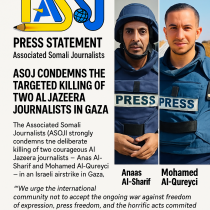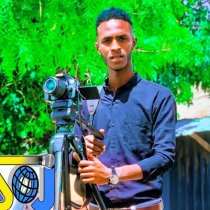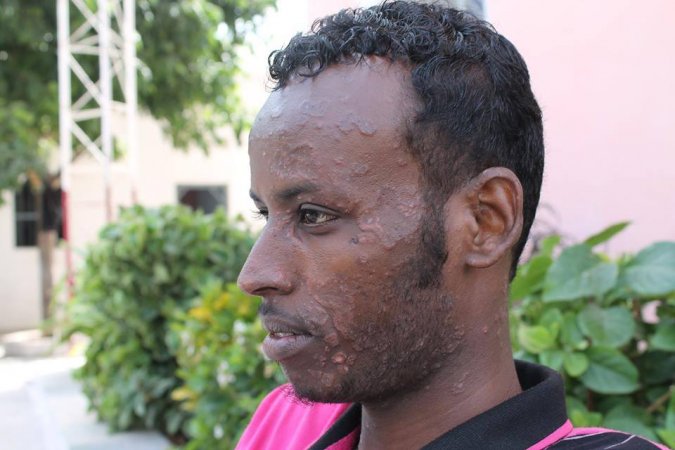
Sword mightier than pen
The violent closure of popular radio station Shabelle in Mogadishu in September was the latest in a series of brutal attacks on Somali media in the past few months, in a development that signals a growing pattern of suppression of freedom of expression in the Horn of Africa country.

Since the collapse of the former Somali
regime in 1991, the local media has been striving to operate in the most
exceptional situations, matched only by a few other places in the world.
Only the print media was operational until
the beginning of this decade, when FM radio stations began to mushroom across
the country, reaching millions of Somalis who did not have access to the print
media because of widespread illiteracy.
But the growth of the media in Somalia has
faced strong opposition and continues to be hampered by concerted efforts to
curtail and silence independent voices.
In the country's northwest, the government
of the self-proclaimed republic of Somaliland does not allow the private
ownership of radio stations, and independent media is confined to newspapers
whose circulation is limited because of the lower rate of literacy.
Journalists are often arrested and accused
of false reporting or ordered to reveal their sources. Newspaper offices are
constantly raided and searched without warrants.
In the self autonomous region of Puntland
in the northeast, a number of journalists have faced harassment from authorities
and some radio stations have been briefly closed down on repeated occasions for
reporting excesses by security forces.
However, both Somaliland and Puntland,
which have enjoyed relative calm, despite all are considerably more respecting
of freedom of expression in comparison with southern Somalia, where the most
appalling attacks on the media took place this year in Mogadishu after the
transitional federal government, backed by Ethiopian forces and supported by the
US, ousted Islamists late last year.
This year alone, seven Mogadishu
journalists have been killed, four others shot and wounded and several detained.
Others have faced daily harassment.
In August, three prominent journalists
were killed: Mahad Ahmed Elmi of Capital Voice radio, shot dead on 11
August; Ali Iman Sharmarke, head of HornAfrik media, killed on the same
day by a car bomb as he was returning from the funeral of a slain
colleague.
On 24 August, Abdulkadir Mahad Moallin
(known as "Kaskey") of Radio Banadir, was killed as he was returning from
a training session in the south.
No one has claimed responsibility for any
of these assassinations, and there are no official suspects. Somali government
officials have promised protection for the media, but so far this promise has
been an empty one.
The transitional government, which has
shown its unwillingness to tolerate a free press, has repeatedly closed down
media outlets in Mogadishu and arrested journalists reporting on security
operations by Ethiopian and Somali troops - particularly in cases that have seen
civilian rights violated.
On 18 September, Somali government
soldiers raided the offices of the Shabelle Media Network in Mogadishu,
spraying the building with a volley of gunshots, damaging equipment.
Following the raid, 18 staff members were
briefly detained and threatened before being released.
Since then, the station has remained
closed, with soldiers deployed around the building.
On a statement posted on Shabelle's
website on 20 September, the radio administration expressed disappointment over
the incident.
"We are sadly announcing that our media
network has ceased all its media activity after forces from the transitional
government of Somalia randomly fired at our premises in Mogadishu," the
statement said.
"The damage caused by heavy gunfire
directed at our premises is immense so we cannot continue operating our radio
station. All the equipment including our main studio has been destroyed after
two and half hours of firing by the government forces."
International media watchdogs and some
governments have voiced their concern for the "new wave" of attacks on media in
Somalia, "the world's second most dangerous place for journalists after
Iraq."
In a letter to UN Secretary-General Ban Ki
moon, International Federation of Journalists (IFJ) Secretary General Aidan
White, said, "Mogadishu has experienced the worst press freedom violations, with
journalists facing constant attacks, harassments, libel and intimidation.
"This has sent a chilling message to the
journalist community there that not only will they not be protected but in fact
they will be targeted if they publish investigative or critical articles. This
has led to self-censorship, an exodus of journalists from their profession and
crippled news dissemination.
"Despite this crisis and the constant
death threats, detention and arrest that our colleagues in Somalia face, many of
them are continuing to work independently despite the risk to their personal
safety."
The watchdog Reporters Without Borders
condemned the action of the Somali security forces and laid the blamed squarely
at the feet of the transitional government.
"The transitional federal government's
failure to take action in these circumstances in incomprehensible," the group
said in a late September statement. "Caught in the crossfire of targeted
killings and arbitrary arrests, Somali journalists have reached a critical
threshold that is threatening the survival of an independent press in
Somalia."
The new UN envoy for Somalia, Ahmedou Ould
Abdallah, following his first visit to the capital said that Somali government
leaders had admitted to him in private that the action taken against Shabelle had been a mistake and would not happen again.
A US State Department spokesman said
Washington was gravely concerned as the broadcaster had played a vital role in
political dialogue and reconciliation.
"We are gravely concerned about the recent
violent attacks on the Shabelle Media Network in Mogadishu, Somalia,
which threatened the lives of Shabelle Media employees and resulted in the
Network's subsequent termination of its radio broadcasts," State Department
spokesman Sean McCormack said in a statement.
Despite the support and advocacy by
international watchdogs and foreign governments, as Shabelle radio remains
closed and the exodus of journalists increases, the fate of Somali press freedom
is in jeopardy.
As a journalist with a family living in
Mogadishu, working in a situation in which your hoped-for guardian could
imprison you or worse for asking the wrong question is frightening at the best
of times. And this nuance to the work takes places against a backdrop of random
roadside bombings, sudden gunfights and stray bullets or mortar shells that
target indiscriminately. This is our reality.
Commentary by Abdurrahman Warsameh in Mogadishu for ISN Security Watch

 0
0 


























Sword mightier than pen
Harassed, beaten, arrested, closed down: Journalists in Somalia brave some of the most exceptional situations as they are targeted by all sides of the conflict.